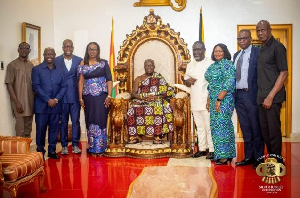- Home - News
- TWI News | TV
- Polls
- Year In Review
- News Archive
- Crime & Punishment
- Politics
- Regional
- Editorial
- Health
- Ghanaians Abroad
- Tabloid
- Africa
- Religion
- Election 2020
- Coronavirus
- News Videos | TV
- Photo Archives
- News Headlines
- Press Release
Business News of Sunday, 22 September 2013
Source: frank obimpeh
Ghana's Economy Still Wobbles On Huge Deficit
The International Monetary Fund (IMF) has attributed the Ghana's large current account deficit of 12.1% Gross Domestic Product (GDP) in 2012, which is projected to increase to above 13% GDP this year, as the main risks to the Ghanaian economy.
The Breton Wood institution added: "Ghana's medium-term economic prospects remain strong, short-term risks arise on the back of sizeable fiscal and external imbalances".
Madam Christina Daseking, who led the IMF mission to Ghana this week, as part of its ongoing engagement with the authorities, noted that the country's economic growth weakened in the first half of 2013, reflecting energy disruptions and high real interest rates.
As energy problems have now subsided, the mission expects full-year growth of about 7%, compared with 8% in 2012. Inflation has risen temporarily above 11 percent, as a result of the significant fuel price adjustments earlier in the year, she told managers of the Ghanaian economy.
The much weaker gold and cocoa prices and ongoing fiscal pressures have been hitting hard on the import dominated economy. With projected reserves of less than three months of imports, the economy is exposed to risks from a potentially deteriorating external environment and global financial market pressures, Madam Daseking stated.
According to her, a preliminary assessment of fiscal performance during the first seven months of the year reveals significant challenges. Consistent with a slowdown in economic activity, revenues have fallen short of expectations, and overruns in the wage bill, electricity subsidies, and high interest payments on public debt are creating fiscal pressures.
However the IMF mission was happy to note: "The government has responded decisively with a sharp retrenchment in other expenditure and the mid-year adoption of revenue measures, such as the reintroduction of the national stabilization and import levies. But, it will be difficult for the government to keep the deficit below 10 percent of GDP".
"The mission welcomed the consensus that is now emerging to reduce the excessive share of wages in government spending. The biometric registration of all public sector employees, the planned introduction of new human resource (HR) guidelines to control hiring, and the agreement to settle wage negotiations before the budget discussions are positive first steps.
"Considering the unsustainable wage dynamics of recent years, a different approach is needed, based on wage moderation and strategic choices about the size and composition of the civil service." The mission agreed with the Ghanaian authorities on the need to reduce subsidies and tackle the problems in the energy sector. It welcomed the reinstatement of the automatic fuel price adjustment mechanism. Going forward, restoration of electricity tariffs to cost-recovery levels will reduce fiscal risks and provide the needed space for higher social spending and critical infrastructure. To support these priorities, the mission also encouraged the government to strengthen its ongoing efforts to improve revenue collection and continue the ongoing public financial management reforms, which have gained renewed momentum.
The IMF mission who has since left Ghana held discussions with the Bank of Ghana to focuse on external risks and the challenges of bringing inflation back to single digits.
The mission stressed the need for rebuilding a prudent reserve buffer. It agreed that monetary policy needs to remain tight until fiscal consolidation is firmly established, and possibly be tightened further if depreciation and inflation pressures heighten.
from frank obimpeh yevu lawrence adomak febiri . freelance journalist netework . accra
________________________________











